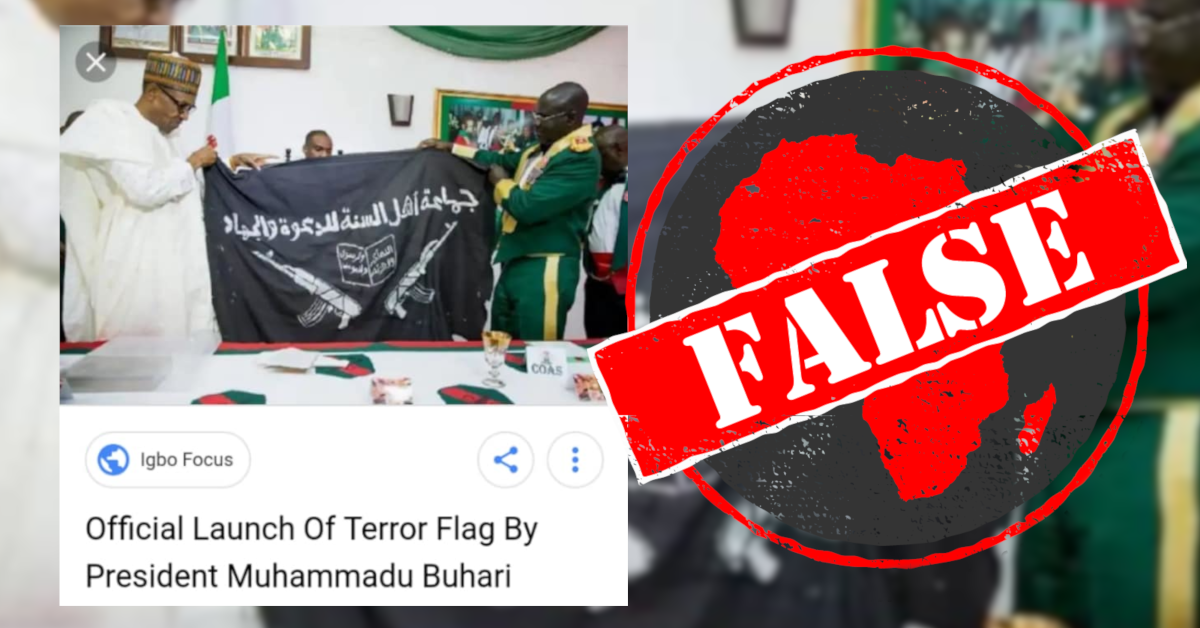A screenshot posted on Facebook on 6 June 2019 claims Nigeria’s President Muhammadu Buhari “launched a terror flag”.
It shows an image of Buhari and an unidentified man in military uniform holding a black flag with Arabic script above drawings of a book and two assault rifles. The text reads: “Official Launch of Terror Flag by President Muhammadu Buhari”.
Most of the comments on the post call it out as a fake. But it’s still been shared 142 times.

A reverse image search shows that the photo first surfaced online on 31 December 2016 on Nigerian digital news platforms. Articles on Vanguard, Pulse.ng, and PM news reveal that Buhari was receiving a “captured Boko Haram terrorist flag”.
They identify the man handing the flag to Buhari as Nigeria’s the chief of army staff, Lt Gen Tukur Buratai.
According to captions to series of pictures, the Nigerian army had successfully captured “Camp Zero”, a major enclave of the Boko Haram insurgency. As a sign of conquering their opponents, they took with them the terror group’s flag.
We also found a video by the Nigerian Television Authority (NTA) published on 2 January 2017 showing the exact moment Buhari received the insurgents’ flag.
Buhari posted the photo on his official Twitter account, saying: “The Boko Haram flag recovered from Camp Zero. The COAS, Lt. Gen. Buratai handed it over last night, at the Guards Brigade Regimental Dinner.” The tweet is dated 31 December 2016.
So it’s false for the Facebook user to claim the photo shows Buhari “launching a terror flag”. Handing the flag to the president was a symbolic gesture by the army to indicate a victory against Boko Haram, as the video explains. - Grace Gichuhi
It shows an image of Buhari and an unidentified man in military uniform holding a black flag with Arabic script above drawings of a book and two assault rifles. The text reads: “Official Launch of Terror Flag by President Muhammadu Buhari”.
Most of the comments on the post call it out as a fake. But it’s still been shared 142 times.

Army chief handing captured flag to president
A reverse image search shows that the photo first surfaced online on 31 December 2016 on Nigerian digital news platforms. Articles on Vanguard, Pulse.ng, and PM news reveal that Buhari was receiving a “captured Boko Haram terrorist flag”.
They identify the man handing the flag to Buhari as Nigeria’s the chief of army staff, Lt Gen Tukur Buratai.
According to captions to series of pictures, the Nigerian army had successfully captured “Camp Zero”, a major enclave of the Boko Haram insurgency. As a sign of conquering their opponents, they took with them the terror group’s flag.
We also found a video by the Nigerian Television Authority (NTA) published on 2 January 2017 showing the exact moment Buhari received the insurgents’ flag.
Buhari posted the photo on his official Twitter account, saying: “The Boko Haram flag recovered from Camp Zero. The COAS, Lt. Gen. Buratai handed it over last night, at the Guards Brigade Regimental Dinner.” The tweet is dated 31 December 2016.
So it’s false for the Facebook user to claim the photo shows Buhari “launching a terror flag”. Handing the flag to the president was a symbolic gesture by the army to indicate a victory against Boko Haram, as the video explains. - Grace Gichuhi
Republish our content for free
For publishers: what to do if your post is rated false
A fact-checker has rated your Facebook or Instagram post as “false”, “altered”, “partly false” or “missing context”. This could have serious consequences. What do you do?
Click on our guide for the steps you should follow.
Publishers guideAfrica Check teams up with Facebook
Africa Check is a partner in Meta's third-party fact-checking programme to help stop the spread of false information on social media.
The content we rate as “false” will be downgraded on Facebook and Instagram. This means fewer people will see it.
You can also help identify false information on Facebook. This guide explains how.


Add new comment